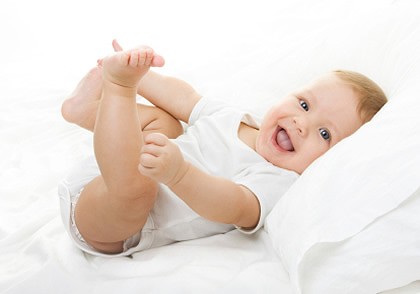Welcome to part 2 of our series on constipation in babies. In part one we looked at the issue of constipation and breastfed babies and in 
How do I know my baby is constipated?
Whilst the sight of a baby grunting, being red faced and seeming to strain as they pass stools indicate constipation, this is not necessarily the case. It is usual for a baby to show some discomfort and in fact, it is considered quite natural.
Here is a short list of signs that may be a cause of concern.
1. Babies who are not exclusively breastfed or are bottle fed usually pass a bowel motion every day. If your baby goes more than a couple of days without passing a stool, this maybe an indication that they may be at risk of constipation.
2. During hot weather, a baby who is not breastfed will need extra cool boiled water. If your baby is not having extra fluids during the summer months, is not having a lot of wet nappies and the urine passed is strong smelling and darker in colour, this may be a sign that your baby needs extra fluids and could be at risk of constipation.
3. If you notice your baby’s stools are small, hard and pebble like and he or she cries when she passes them, it’s probable your baby is constipated. Sometimes, this constipation may be accompanied by some blood in the stools, which can be worrying. (But is usually not a cause for concern). Your baby may also show signs of being tired or listless. If your baby shows any of these signs, do give some extra cool boiled water and seek medical advice.
It is very important for all parents to understand how quickly a baby can develop complications from dehydration. If your baby shows signs of having a fever, is not drinking plenty of fluids, or if your baby has a convulsion or is unwell for any length of time, you must seek medical help, even if you think it may only be a head cold.
When is my baby at risk of developing constipation
If you were breastfeeding your baby and you have decided to introduce or switch to formula feeds, you may seem surprised that your baby is passing stools more often. This is perfectly normal. A breastfed baby may only pass a bowel motion one a week or even less.
Babies who are formula fed often pass stools every day, so expect your formally breast fed baby to have more dirty nappies. However, this changeover to formula (or to a different formula if you have always formula fed your baby), can cause constipation. Changing back to your old formula should quickly rectify any problems.
Change of diet is the reason these babies develop constipation and the introduction of solid foods to a baby’s diet may trigger the same pattern. Often these stages are short lived and once your baby’s digestive system adapts to the new diet, they will begin to pass stools normally and comfortably. By being aware your baby may develop constipation when you change their diet, you can increase the amount of water you give them to drink, to try and prevent it’s development.
Many of the foods we traditionally give as first foods to our baby’s such as baby rice cereal and bananas are difficult for a baby to digest. Alternative foods such as pureed fruits and vegetables are perfectly safe to give babies and may help prevent constipation. Be aware that every baby is different and whilst other babies may have no problems with a particular food, your baby may experience changes to his bowel motions if you feed him this same food.
Most babies tolerate dietary changes very well. Be aware however, that when you introduce anything new into a baby’s diet, his stools smell and colour can change and this is perfectly normal and is usually not indicative of any problems. If however the smell, colour and consistency change and your baby seems distressed, it may be a sign of a food intolerance and you should stop the food until the symptoms subside and seek medical advice before re introducing them. If the symptoms don’t settle or seem to get worse, talk to your doctor or child health nurse.
It is dangerous to give babies laxatives, enemas or anything to try to make them go to the toilet and you must seek medical help as soon as possible if your baby develops symptoms or signs of constipation to safely correct the problem.
This article was written by Carol Groves: Carol trained and worked as a nurse and midwife in Australia and overseas, many years ago before having children. Later I trained and worked as a breastfeeding counsellor with Nursing Mothers (now Breastfeeding Australia). Today I am preparing to be a Doula (Childbirth and Peri natal Support Person) and Mother’s Helper. My website is being developed at http://muslimumi.com.
